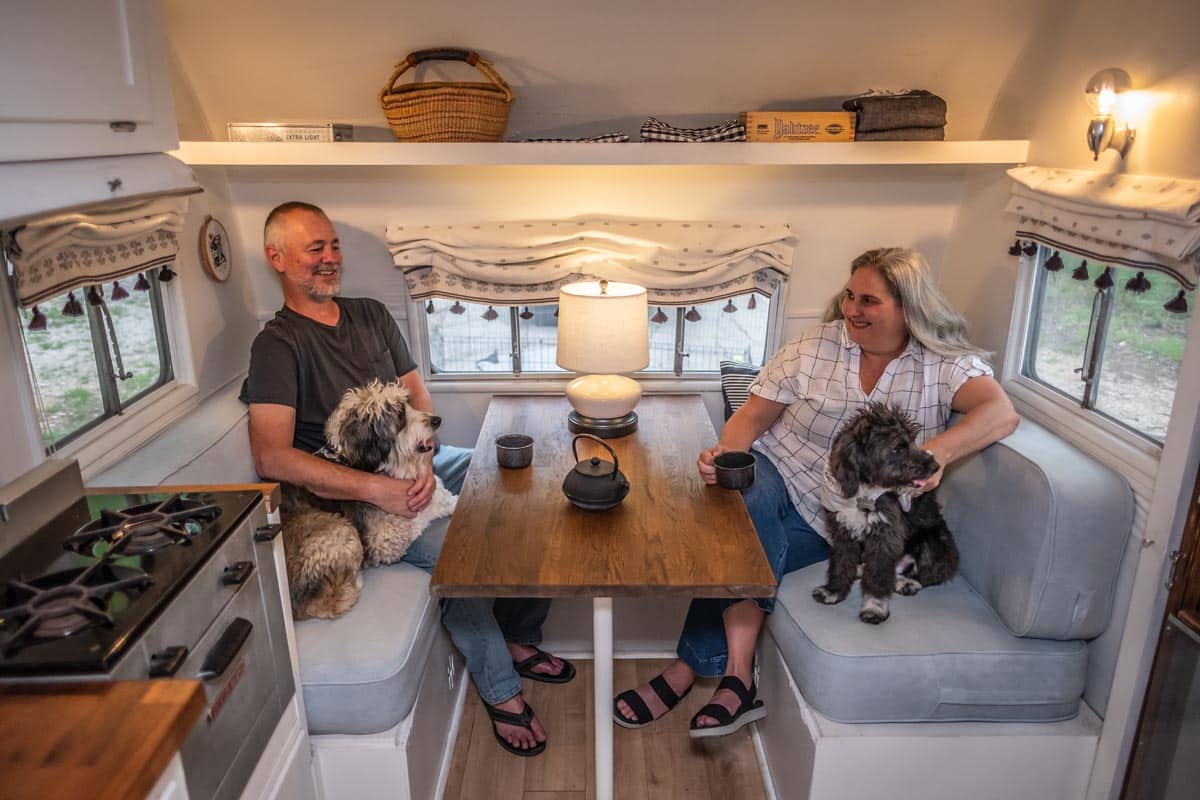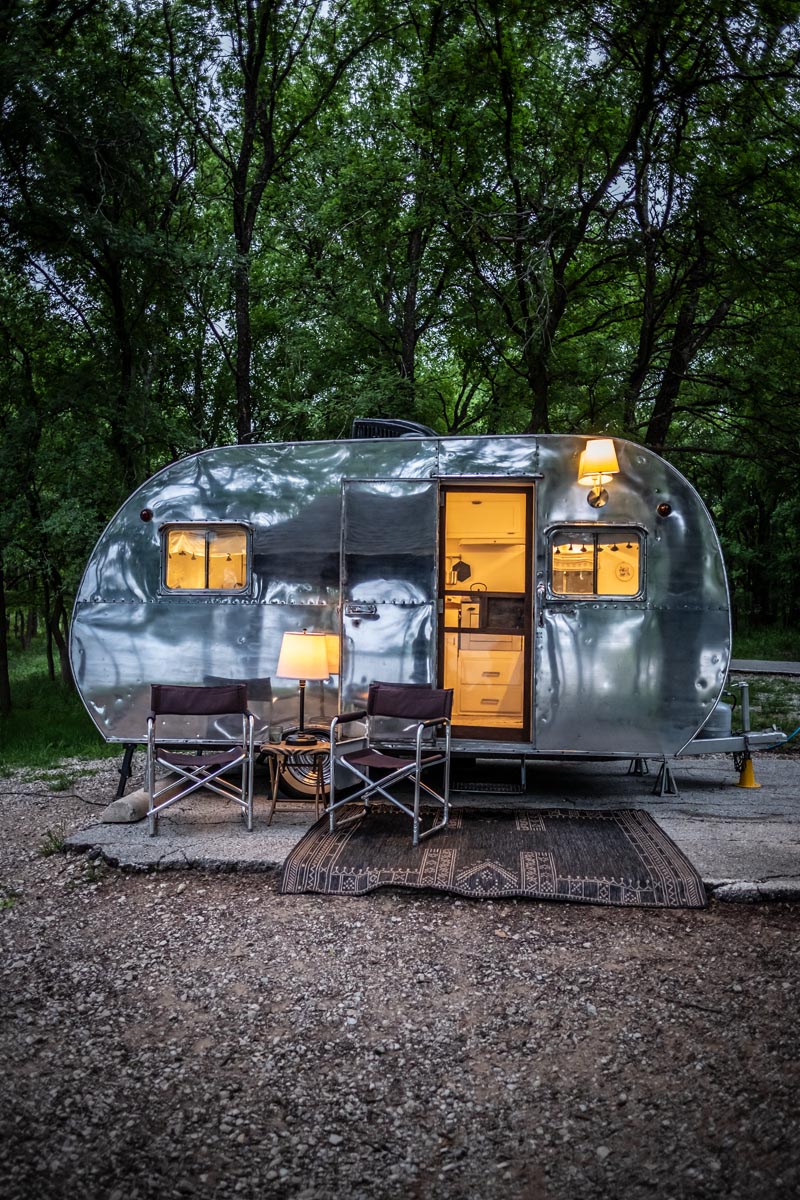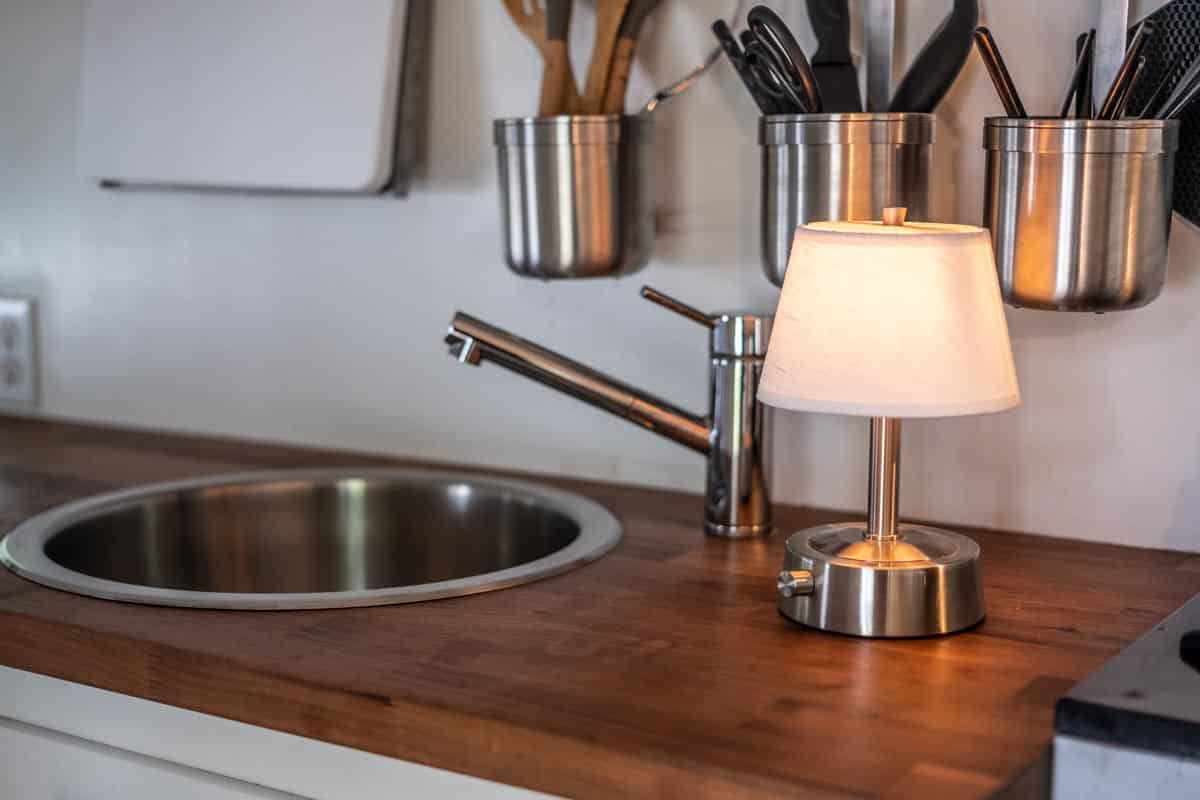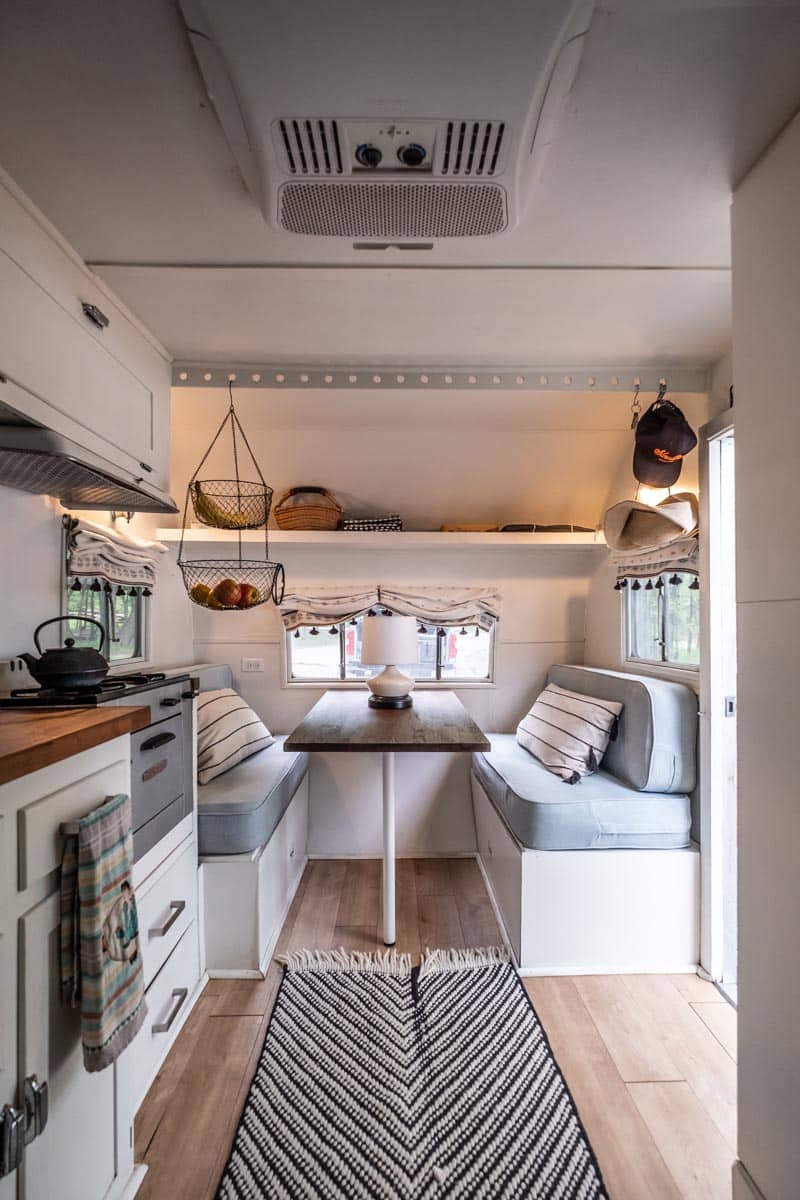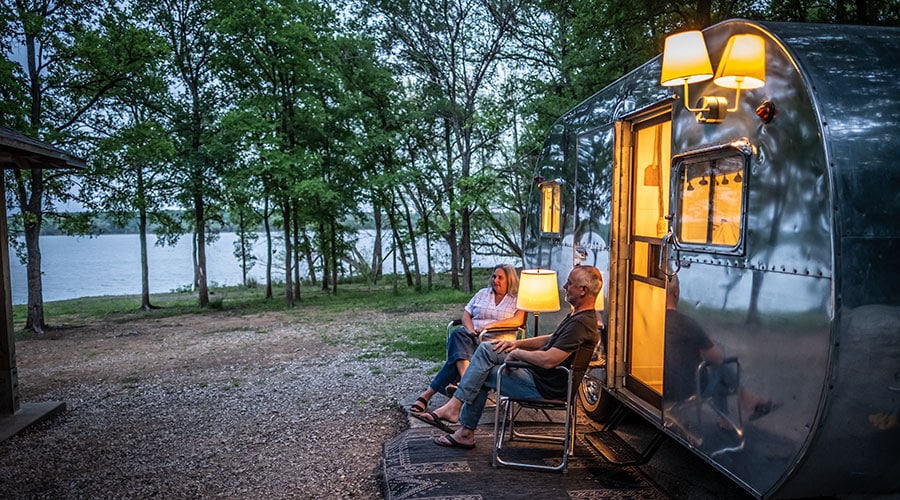
On the Glow
By Scott Nishimura
Photography by Olaf Growald
Modern Lantern founders Carrie and Stephen Fitzwater get ready to hit the road for the summer in their vintage ’54 Owosso trailer
arrie and Stephen Fitzwater — on the hunt for a used camper and at the unsuccessful end of multiple offers to buy one — finally found a vintage 1954 Owosso trailer for sale in the yard of an Arlington garden shop that was moving to Dallas.
“They’d been using it for a pop-up shop, and then they stopped doing that and were using it for an office,” Stephen says.
After shelling out $3,200 and making the quick trip home to Fort Worth, the Fitzwaters were ready to go camping. Or so they thought. “We were going to try to just start using it,” Carrie says. “And one thing before you knew it, the whole inside of the trailer was on the ground.”
OK, so another $4,000 later — after a gut job and restoration — and the Fitzwaters were on the road. The shiny Owosso, Airstream-like in its polished aluminum skin but more angular, has hit the road with the Fitzwaters to Michigan and Santa Fe and places in between. The empty-nester couple and their affable Aussiedoodles Eli and Milo — “Stephen, how do you spell Aussiedoodle?” Carrie asks — are getting ready to hit the road this summer for Santa Fe.
And just in time. Like many other North Texans, the Fitzwaters like to beat the heat and escape to favorite cooler spots during the hot months. Their story wraps all into one a number of 360West’s loves — summer travel, home, working dogs (Eli and Milo accompany their humans to work every day, whether work is at the office or a campsite) and how we roll.
Run into the Fitzwaters at their campsite at dusk and it’s likely their Owosso will be lit — inside and out — with what the Fitzwaters design and sell for a living: rechargeable battery-powered luxury fashion lamps. The Fitzwaters founded their company, Modern Lantern, in Fort Worth in 2011. And today, the company sells into the luxury home and commercial markets, ranging from restaurants to hotels.
The Fitzwaters see their lamps in odd places, like on the tables at a Hollywood awards show they were watching recently. “Isn’t that our lamp?” Stephen asked Carrie, pointing out the Modern Lantern lamp in the middle of a vignette.
Carrie was in residential design and trying to light the center of the great room of a luxury home with no floor electrical outlets when the idea for Modern Lantern occurred to her. Sales have grown 20-30 percent annually since the company started, the Fitzwaters say (they don’t discuss gross sales). The company also holds multiple patents related to their lamps’ removal batteries and how the power source works with the lamps.
Stephen handles Modern Lantern’s product design and development, a job he once did for The Bombay Co. Modern Lantern manufactures its metal lamps in China and ceramic lamps in the United States. They sell exclusively through their website, modernlantern.com, which simplifies the business.
Modern Lantern tried to sell through resellers, but that fell apart on customer service, the Fitzwaters say. “They just couldn’t answer any questions” about the product and couldn’t troubleshoot, Stephen says.
For one, some customers tried to install their own bulbs.
“A traditional lightbulb is 120 volts,” Carrie says. “Ours are a 12-volt. The voltage has to match, the output and the input have to match.”
Commercial sales have grown into about 60 percent of the business, the couple say.
Restaurant orders started to pick up after a Pacific Palisades, California, business put the lamps on its dining room tables.
“The restaurant is gorgeous,” Carrie says. “All of a sudden, we started getting all these orders from people who saw it at The Draycott. We just started getting all these restaurant orders.’
Modern Lantern’s commercial lamps come with two rechargeable batteries; the company’s other lamps come with one.
The lamps’ removable batteries are a big differentiator against competitors, the Fitzwaters say.
“Some [competitors’ lamps] literally run off of AA batteries,” Carrie says. In a residential setting, “that’s fine. But for 50 of them [in a restaurant]? No.”
Modern Lantern has three other employees in addition to the Fitzwaters, including a warehouse worker who fulfills orders from the company’s Northside offices and warehouse.
The simplified business makes it that much easier for the Fitzwaters to blow out of town during the summer. Selling exclusively through their website means no unnecessary corporate infrastructure like accounts receivable and payable, the Fitzwaters say.
“And it’s all on one centralized dashboard that we’re able to run the business,” Carrie says. “We can be out camping, and we sit there, and we’ll get cha-ching. ‘Oh, we just got an order.’ And then our warehouse girl comes in and she prints out all the orders.”
Which brings us back to the Owosso. Tired of tent camping, the Fitzwaters decided to look for an RV. One thing: They weren’t interested in laying out a huge sum for it.
“We’d already lost one or two sales right out from under us, where you shake hands, you go back and he sold it to somebody else,” Stephen says. “I just went to the bank to get cash. How, in those 15 minutes, did you sell it to somebody else?”
Then finally, came the Owosso find. Ostensibly, the 1,800-pound single-axle trailer wasn’t in terrible shape. “It rolled,” Stephen says. “There were minor dents and damage.”
But much of the wooden interior was rotted, so the Fitzwaters tore it out and replaced the old poplar with new poplar. “We wanted it to be as classic as possible,” Carrie says. “We couldn’t salvage the wood on the inside, so we had to completely replace it.”
The trailer had a spot for a potbelly stove, but that was missing. The Fitzwaters wanted more cabinetry anyway, so they installed new ones on that side of the interior and removed and sanded down the existing cabinets.
They added air conditioning, hired an electrician to rewire the trailer, restored the original two-burner stove and put in butcher block countertops and hardwood floors.
“Once you start ripping stuff out, you figure everything’s going to come out,” Carrie says.
The trailer doesn’t have a bathroom, so the Fitzwaters take care to choose campgrounds with facilities.
Within three months, she estimates, they were camping in it. For their first test run, they drove the trailer to Tyler to visit Stephen’s parents.
Their first big trip: Michigan, where they camped at a state park on Lake Michigan. “It’s like an ocean,” Carrie says. “You couldn’t see to the other side. The waves were rolling in. It was beautiful.”
The trailer has also seen the Palo Duro Canyon, and Bentonville, Hot Springs and Little Rock, Arkansas (the Fitzwaters like sites where Stephen can go mountain biking). Every summer, the couple escapes to Santa Fe for up to two weeks. That’s a bit of a distance for the trailer.
“We like to stay in a five-hour perimeter around us,” Carrie says. That’s what the trailer can handle? “That’s what Stephen can handle,” Stephen says.

